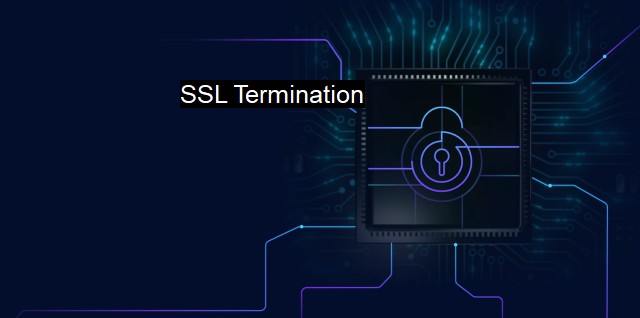What is SSL Termination?
Understanding SSL Termination and Its Importance in Cybersecurity for Online Transactions
SSL Termination is a widely-used strategy in the realm of cybersecurity that plays a vital role in ensuring safe and secure communication over the internet. SSL, an acronym for Secure Sockets Layer, is a protocol for establishing secure links between two points in a network. Termination, on the other hand, refers to the end point where a network connection is concluded or terminated.The SSL termination process involves an TLS/ SSL load balancer, which is located on the server-side. This balancer takes on the responsibility of managing the SSL handshake and decrypting incoming requests before sending them to the back-end servers. In simpler terms, SSL termination happens when an SSL connection is unwrapped or decrypted at the server's end, which then continues communicating with the client using the non-encrypted HTTP protocol.
This process is crucial for enhancing the performance of servers. As encryption and decryption of data can be enormous processing tasks, they can potentially overwhelm the back-end systems. By implementing SSL termination, the massive load of handling SSL processes can be taken from the back-end and given to specialized machines, the SSL terminators, thereby reducing the burdens on the back-end systems and speeding up their operations.
In the cybersecurity context, SSL termination provides a significant security enhancement. While HTTP protocol can potentially expose sensitive data to hackers through a man-in-the-middle attack, SSL prevents this situation by creating a secure encrypted connection. By terminating or decrypting the SSL at the server end, we can inspect the incoming traffic for potential threats such as cyberattacks or viruses, something that was impossible with the SSL encrypted traffic.
With every advantage, there comes a potential risk. Utilizing SSL termination poses a security risk as it exposes decrypted traffic within internal networks. If malevolent actors gain access to these internetwork pathways, they can intercept and manipulate the unwrapped sensitive information, including financial data or personal identity. Therefore, it's essential to protect these sensitive data from becoming easy targets by setting up closed or private networks where this un-encrypted data travels.
While SSL termination takes a significant load off from the servers, it can also lead to a potential single point of failure if not properly set up and managed. If the SSL terminating load balancer fails for some reason, the secure links between the communicating points will be lost, disrupting the entire network's effective working. Therefore, it's critical to have a failover system in place, where another device picks up and continues the work if a machine fails, to avoid these scenarios.
Nonetheless, despite these potential risks, the benefits of SSL termination outweigh the challenges, especially when coupled with the right security measures. These measures could include having redundancy plans for the SSL termination to prevent service disruption, enforcing top-notch network security for decrypted data, conducting regular networking tests and audits, and keeping patches and system upgrades up to date.
SSL termination is a double-edged sword; it offers immense promise in load balancing, increasing server efficiency, and offering potential to check for threats and vulnerabilities. At the same time, it introduces risks associated with unencrypted internal communication traffic. with appropriate safeguards and security protocols, these risks can be mitigated, making SSL termination an integral part of modern network architecture, as far as cybersecurity is concerned.

SSL Termination FAQs
What is SSL termination in cybersecurity?
SSL termination refers to the process of decrypting encrypted web traffic (HTTPS) from the SSL/TLS encryption before it reaches the web server or application.Why is SSL termination important in antivirus protection?
SSL termination allows the antivirus program to inspect and analyze encrypted web traffic for potential threats, such as malware or viruses. Without SSL termination, antivirus software would not be able to detect and prevent these threats.How does SSL termination work?
SSL termination works by having a device, such as a load balancer or proxy server, intercept the encrypted web traffic and decrypting it using its SSL/TLS certificate. The device then sends the decrypted traffic to the web server or application.What are the benefits of SSL termination in cybersecurity?
SSL termination provides several benefits for cybersecurity, including the ability to inspect encrypted web traffic for threats, improved performance and scalability, and centralized management and control over SSL/TLS certificates. Additionally, SSL termination can help prevent SSL-based attacks, such as man-in-the-middle attacks.| | A | | | B | | | C | | | D | | | E | | | F | | | G | | | H | | | I | | | J | | | K | | | L | | | M | |
| | N | | | O | | | P | | | Q | | | R | | | S | | | T | | | U | | | V | | | W | | | X | | | Y | | | Z | |
| | 1 | | | 2 | | | 3 | | | 4 | | | 7 | | | 8 | | |||||||